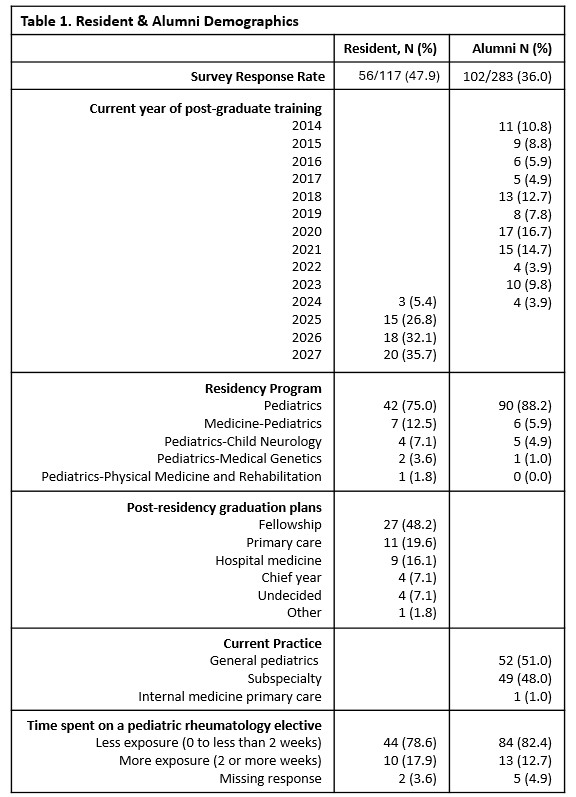Session Information
Session Type: Poster Session C
Session Time: 10:30AM-12:30PM
Background/Purpose: The shortage of pediatric rheumatologists and resulting limited patient access necessitates that pediatricians receive adequate training in core pediatric rheumatology (PR) topics to address patient concerns. University of Colorado pediatric residency (UCPR) trainees receive training from pediatric rheumatologists, but resident and alumni opinions on its importance and effectiveness are unknown. This study aimed to describe the perceived importance of PR education and current programs’ effectiveness in preparing UCPR graduates for their next phase of practice via needs assessment surveys sent to residents and residency alumni.
Methods: Anonymous surveys were sent to (1) current trainees and (2) alumni (graduated 2014 – 2023) in spring 2024. Results were analyzed using descriptive statistics. To explore possible effects from exposure to the PR elective, respondents were split into groups based on total PR elective time: less exposure (0 to < 2 weeks) versus more exposure (≥ 2 weeks). Differences between groups were analyzed using ANOVA.
Results: The survey response rate was 47.9% (56/117) and 36.0% (102/283) for residents and alumni, respectively. Most residents (78.6 %) and alumni (82.4%) completed < 2 weeks of a PR elective. Overall, 41.1% of residents felt not at all confident they have the PR knowledge needed after graduation while only 15.7% of alumni felt not at all confident that they have the PR knowledge needed in their current clinical practice. Both residents and alumni in the more exposure groups reported greater confidence that they have the PR knowledge they (will) need compared to peers in the less exposure groups (p = < 0.001 and p= 0.033). 30.4% of residents and 27.4% of alumni were not at all confident they have the MSK exam skills needed after graduation or in their current clinical practice and confidence did not differ between exposure groups. Alumni in the more exposure group were more confident that they consider rheumatologic diagnoses when they should be on the differential (66.7% vs. 23.8%, p=0.008).
Conclusion: Although patient access to PR specialists is limited, most UCPR pediatric residents do not complete a 2 or more-week PR elective. This may disadvantage graduates and patients, as alumni who had less exposure to PR training reported less confidence in their PR knowledge. Results also suggest that current PR education opportunities do not significantly improve MSK examination skill confidence. Results highlight the importance of resident PR education and illuminate curricular improvement opportunities, specifically with respect to the MSK exam. Planned next steps include curricular revision focusing on MSK exam training and development of novel learning tracks for future generalists and subspecialists.
To cite this abstract in AMA style:
Nowicki K, Silveira L, Curran M, Lockwood L. Perceptions of the Importance of Pediatric Rheumatology Education in Pediatric Residency: A Needs Assessment [abstract]. Arthritis Rheumatol. 2025; 77 (suppl 9). https://acrabstracts.org/abstract/perceptions-of-the-importance-of-pediatric-rheumatology-education-in-pediatric-residency-a-needs-assessment/. Accessed .« Back to ACR Convergence 2025
ACR Meeting Abstracts - https://acrabstracts.org/abstract/perceptions-of-the-importance-of-pediatric-rheumatology-education-in-pediatric-residency-a-needs-assessment/


.jpg)
.jpg)